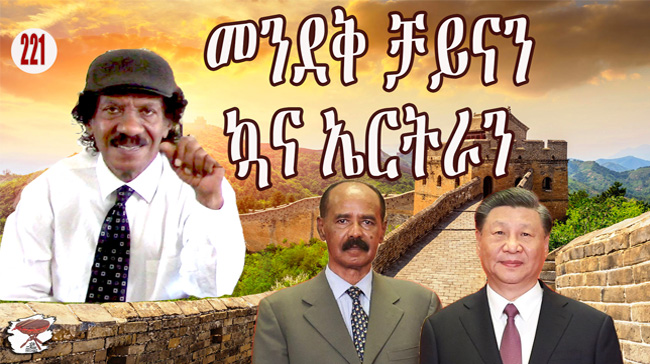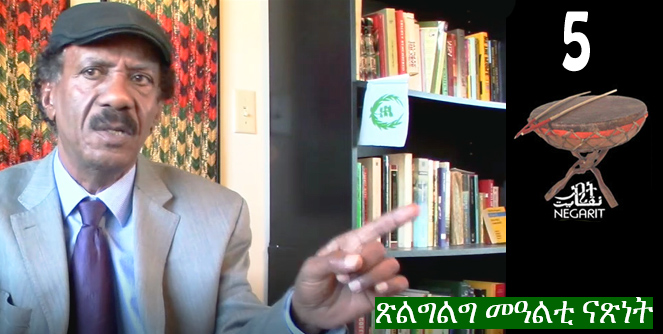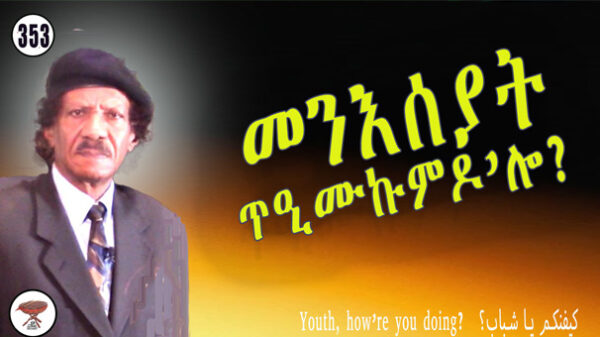China’s Great Wall, Eritrea’s Fence Wall
Last Saturday, Isaias hastily met the Sudanese envoy Ambassador Daffalah, and soon left for China. Not many discussed that visit, but many Eritrean (and Ethiopian) social media platforms were buzzing with Isaias’ visit to China. The Eritrean fence wall concluded his visit and has already returned home.
PFDJ media and its affiliate trolls were so excited they claimed Isaias was given an exceptional reception, “unlike any other reception afforded to other heads of state.” However, China and North Korea are known for their colorful parades and military shows; organizing them is a child’s play for the nations that perfected the art of parades. In fact, many African countries have copied the style, and it didn’t take Eritrea long—a few festivals and they joined the professional league. Credit for perfecting the Eritrean parade culture mainly goes to Zemehret Yohannes, the ex-ELF-Saghem member who joined the EPLF in the 1980s. He was succussed by Zemede Tekle, ex-ambassador to Italy and a graduate of the Soviet Union, who perfectly fill his predecessor’s shoes.
Parades are a perfect propaganda tools: they inject a nationalist fervor in the general ambience, and make people live in days of never-ending festivities. They also increase the level of pseudo patriotism to the extent that dancing in a festival is considered akin to sacrificing one’s life for the nation. Meanwhile, the thought-police in dictatorships nations gauge the dedication of a citizen by the level of dedicated attendance in festivals, some fall for that testimony. They believe that trivial yardstick is the measure of a citizen’s contribution; it attests to one’s love of a nation and loyalty to the rulers.
Ruling party loyalists spend good money on the seasons’ paraphernalia; some buy on affordable paper flags while others spend on exquisite flamboyant attires decorated with Eritrean (and Ethiopian) flags. Regimes with leftist orientation, the progressives as in the cold war era consider that a sign of utmost loyalty and an effective propaganda tool. All of that is displayed against the backdrop of shows of hundreds of meticulously trained school children in stadiums and public spaces. Isaias Afwerki’s’ visit to China will certainly give a boost to that kind of Eritrean nationalism.
But was the reception afforded to Isaias in China exceptional? It depends.
In 2018, China restructured its guard of honor force: complete change of the uniform, increase in the number of the musicians in the marching band, and importantly, they introduced a women’s formation with the guard of honor. Only one foreign leader enjoyed the reception of the new formation before it Covid hit in 2019 and not many had the chance to see the impressive Chinese guard of honor—check this, it’s linked here.
The man is not known for frequent travels due to many reasons. Isaias doesn’t have many real friendships with world personalities or governments. Isaias’ Eritrea doesn’t have a strategic ally, but tactical friends who are dropped any time an insignificant friction spark. So, China’s reception must be seen in that light.
In his speech at the reception, Isaias said that the China-Eritrea friendship goes back over sixty-two years! That statement needs unpacking.
Starting in 2023 and returning sixty-two years back, crossing 1971, we arrive at the claimed date the Chinese-Eritrean friendship was established. And there we arrive at 1961—the days of Awate. But Isaias wanted a certain milestone that he wanted to highlight. 1967 is the year (not sixty-years anyway, but 56) when Isaias was given an opportunity to receive a seven-month or so long political orientation in China. The political course was arranged by the indefatigable, struggle era leader, the late Osman Saleh Sabbe who passed away in 1987.
Through the help of Syria, Osman Sabbe initiated a contact with China. Soon, members of the Revolutionary command of Eritrean Liberation Front (ELF) visited China. The delegates were Osman Saleh Sabbe, Idris Mohammed Adem, and Idris Gelawdios and they briefed the Chinese authorities about the struggle of the ELF. Thereafter, China agreed to train five cadres from the ELF for about seven months and the following combatants were chosen to attend that political course.
- Region 1: Ahmed Hamid Omer (Living in exile)
- Region 2: Mahmoud Mohammed Saeed “Chekini” (struggle era martyr)
- Region 3: Ahmed Ibrahim “Secretaire” (died in Exile, Sweden)
- Region 4: Ramadan Mohmmed Nur (died in Asmara)
- Region 5: Isaias Afwerki (President of Eritrea)
All were regional political commissioners except for Isaias who was assigned to the weakened Fifth Region after its commander Welday Kahsay surrendered to Ethiopia taking along a bulk of the fighters from the region. Isaias has been with the Fifth region for only a few months before he was sent to China. The trainees carried Somali passports and flew from Damascus to China via Beirut. That batch of trainees was the first and last to be trained in China from the ELF. Syria, Iraq, and to certain extent Cuba, trained the bulk of the ELF combatants, many graduated as cadets and officers.
The above sheds light on the claimed 62 years old Chinese-Eritrean friendship that Isaias mentioned. Ironically, he avoids mentioning the relationships with the Syria and Iraq for partisan expediency. Also, the perception that China gave military training to Eritrean combatants, or that Isaias received one, is all false. He was only given a six-month political training; it was not a military training.
The Killer Emperor and His Soldiers
After 1970, the Haile Selassie regime had taken a careful break from torching villages and massacring Eritrean villagers in the Western region. The Ona and Besekdira massacre of late 1970 was fresh when Haile Selassie made a state visit to China in 1971. It seems many don’t know about it or conveniently forgot, but Haile Selassie’s visit was as colorful as Isaias’ reception. Unfortunately, the audio-visual technology of the day was rudimentary, and the quality of the fifty-two years old footage is grainy, hazy, and unimpressive compared to today’s crisp HD footage. That being a brief comparison, information, and correction, what is Isaias’ current visit considered extraordinary?
Isaias has been isolated for too long and naturally, such an opportunity must be milked to the last drop. Many of his supporters don’t know neither the history nor the type of reception that China is used to give to its visiting heads of state, including other African leaders. China is good as such shows and that’s it’s political culture, the usual protocol of and usual reception “Made in China.” State sponsored national celebration always have the trademark, lavish and colorful aura of a jamboree. But Eritreans should ask what will the visit yield, and what useful benefits should be expected by Eritrea? is yet to be seen.
No doubt China is an ideal partner for third world countries in the field of quick development. China’s skill on infrastructure is extraordinary and is displayed all over the world. Is China charitable for doing all that? Sometimes it does, just like the rest of the wealthy countries. Does Chinese aid and cooperation come with strings attached? Yes, it’s no different from other countries, including the West and its influential institutions like the IMF and World Bank. Governments operate on similar arrangement: the left hand taketh what the righthand giveth. However, the West is generous when it comes to supplying allies with armaments and was traditionally generous until they started to subcontract aid to freelancers and security companies. And it’s anyone’s guess what unrestrained absolute dictators prefer: direct cash aid with no control valves.
Definitely China sees benefits in real-estate Eritrea for several reasons: a watch tower to guard its huge investments in the region and its future plans that aspires to connect the Red Sea with West Africa. Also, the big military nations do not like to see their forces squeezed between other forces. Djibouti is becoming just that, it’s time for a breathing space. Besides, ambitious countries like the UAE needs bases to keep the flames alive. And finally, the much-abused Eritrean shores and islands might get real tenants, at least the Arabs prove their long-held paranoia about the imaginary bases in the region, was true. renters rub shoulders with others The Eritrean ruling party is obsessed with its partisan projects as opposed to national projects.
But all will be in vain unless the fence wall of Eritrea gives way to a modern driveway for trading and cooperation with its neighbors. No development will be worthwhile unless the government opens up and rule of law is established in the country. A nation run by proclamations, with no public participation, no semblance of rule of law, or constitutional controls and references, will remain stuck in its place. Importantly, a government whose sole orientation is the diplomacy of war and doesn’t mind excluding a big chunk of its citizens, cannot develop even if the sky rains gold nuggets for an entire season.
Unfortunately, any event the regime embarks on is quickly positioned as a wedge issue. Its supporters think that such otherwise normal event, like a visit of a head of state to a country, is treated as a victory against its opposition. In short, when everything is seen through the prism of the regime and its supporters, the PFDJ always wins against its opponents. And that perceived victory turns into disaster. Particularly those living inside Eritrea: Please look around and see is the fence wall of Eritrea protected the sovereignty and safety of Eritrea. If it did, please admire it, kneel down and kiss its feet every week. If it didn’t, there are many shrines you can pray at.





Awate Forum